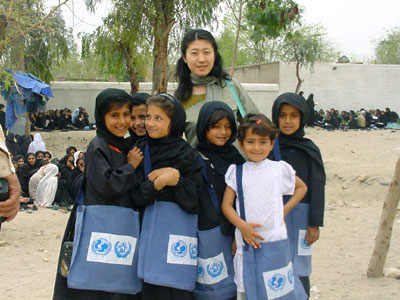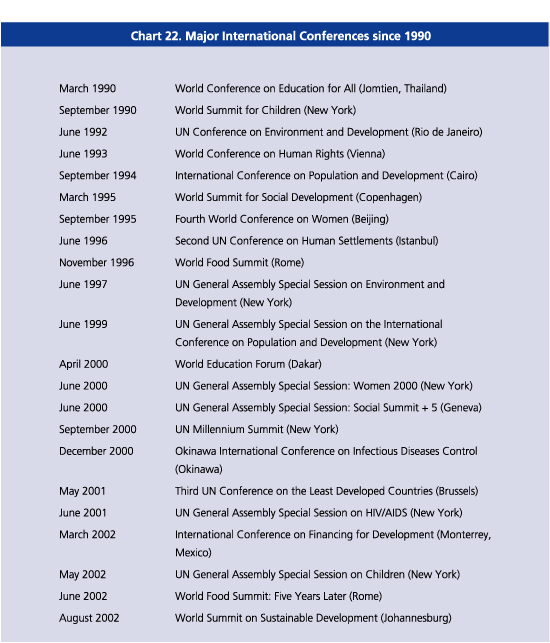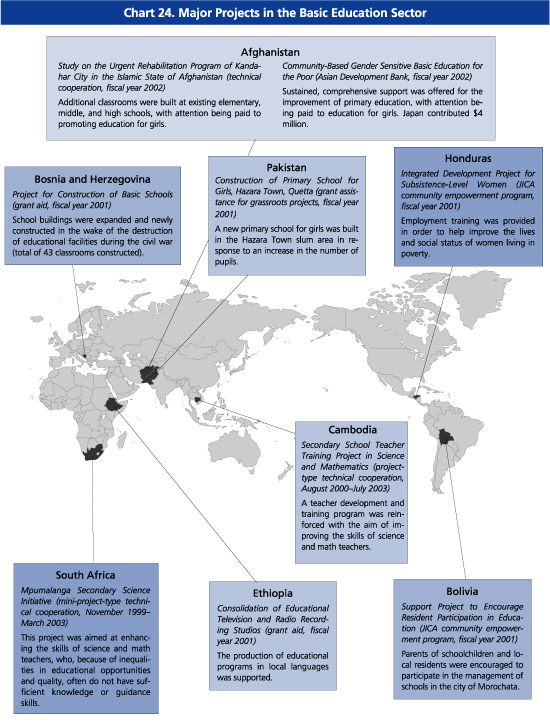Official Development Assistance (ODA)
Japan's ODA White Paper 2002
Part I. Trends in Japan's ODA in a Rapidly Changing World
Chapter 2
Section 5. Efforts toward the Achievement of the Millennium Development Goals
- Toward the achievement of the MDGs Japan will provide support for economic growth and enhance its direct support in social sectors.
- For example, Japan has announced measures and joint initiatives in the areas of education, infectious diseases, the environment, and water and sanitation.
As stated earlier, international development priorities have been incorporated into the Millennium Development Goals (MDGs), and the MDGs have been recognized as the common targets of the international community through a series of international conferences. The MDGs contain targets for specific sectors, such as education, health (especially infectious diseases), and the environment. Recently, it has become very common for discussions to be held by sector, not only at major international development-related conferences but also in the context of cooperation among donor countries and organizations and aid coordination in developing countries in the field. Within this trend, the MDGs have emerged as an important pillar of economic cooperation.
As explained in Chapter 1, Section 1 (2) D, Japan believes that achieving the MDGs, including poverty reduction, will depend on active cooperation toward sustainable economic growth in the developing countries through the promotion of trade and investment, improvement of economic infrastructure, institution building, and capacity building. Japan is also expanding its efforts in areas directly related to the MDGs, such as education, infectious diseases, the environment, and water and sanitation. Specific initiatives are described below.
(1) New Aid Policy for Education
The situation regarding education remains serious, as an estimated 115 million children are not enrolled in school, and 860 million people--two-thirds of them women--are illiterate. Education is a priority area for Japan's ODA both from the viewpoint of "human development"--the acquisition of the knowledge and capabilities necessary to choose one's own future on his or her own--and also from the recognition that capacity building forms the basis for nation building. Furthermore, education is a foundation for growth and employment and is vital for economic development.
Efforts by the International Community In the education sector, universal primary education--the acquisition of basic reading, writing, and calculation skills--is one of the major goals among the MDGs. In April 2000 the World Education Forum was held in Dakar, Senegal, and since then an initiative called "Education for All (EFA)"10 has been underway worldwide, with the UN Educational, Scientific, and Cultural Organization (UNESCO) taking a leading role. UNESCO has been holding meetings of the High-Level Group on EFA and the Working Group on EFA since 2001 and taking the initiative in efforts by the international community in education. At the end of 2001 the Group of Eight (G8) established an expert working group on education assistance to developing countries, and it announced its own recommendations at the Kananaskis Summit in 2002. The World Bank has meanwhile introduced the Fast Track Initiative (FTI)11 to support EFA, especially from the financial side. At its 57th session in 2002, the UN General Assembly adopted a resolution by consensus, advocated by Japan, to proclaim the 10-year period beginning on January 1, 2005, the UN Decade of Education for Sustainable Development to strengthen international efforts in education.
New Measures Announced in Education Assistance by Japan Japan has historically regarded education as the cornerstone of nation building. This is reflected in the emphasis it has placed on building elementary and secondary schools to improve access and opportunities to education, providing assistance for scientific and mathematical education, and dispatching Japan Overseas Cooperation Volunteers (JOCVs). Japan’s assistance has placed particular emphasis on scientific and mathematical education, which can facilitate job training in developing countries. Following the World Education Forum in Dakar in 2000, where a new major trend in assisting education was formulated, Japan announced a new measure on assistance for the education sector at the G8 Kananaskis Summit in June 2002, deciding to provide assistance of more than \250 billion in education over the next five years to low-income countries that are experiencing difficulty in achieving the goals set down in the Dakar Framework for Action.12 It also announced the Basic Education for Growth Initiative (BEGIN) that states priority areas for Japan’s assistance in basic education.
1. Basic Philosophy
- Emphasis on a commitment by the governments of developing countries and support of ownership
- Recognition of cultural diversity and promotion of mutual understanding
- Assistance based on collaboration and cooperation with the international community (partnership)
- Promotion of community involvement and the utilization of local resources
- Linkages with other development sectors
- Utilization of Japan's experience in education
2. Priority Areas
- Assistance for ensuring Access to education
⌘ Construction of school buildings and related facilities serving various needs
⌘ Assistance for elimination of gender disparities (girls' education)
⌘ Assistance for nonformal education (promotion of literacy education)
⌘ Active utilization of information and communication technology (ICT) - Assistance for improving Quality of education
⌘ Assistance for science and mathematics education
⌘ Assistance for teacher training
⌘ Assistance for improvement of school administration and operation - Improvement of Management of education
⌘ Enhancement of support for formulation of education policies and education development plans
⌘ Assistance for improvement of educational administration system
3. New Efforts by Japan
- Utilization of in-service teachers and establishment of "cooperation bases"
- Promotion of wide-ranging collaboration with international frameworks
⌘ Support to UNESCO
⌘ Support to UNICEF
⌘ Consideration of World Bank's Fast Track Initiative
⌘ Participation in the Association for the Development of Education in Africa (ADEA) - Support for education for post-conflict nation building
These measures were incorporated into the Koizumi Initiative, a package of policy measures for sustainable development announced by Japan prior to the World Summit on Sustainable Development (WSSD) in August, and developing countries have expressed high expectations of Japan’s concrete support. While taking note of international trends, Japan intends to provide its assistance in education according to this initiative, emphasizing improvements in access to and opportunities for education, educational quality, and public administration and management.
In December 2001 the Interim Authority was inaugurated in Afghanistan with Hamid Karzai as its leader, and peace and freedom returned to the country. For many years Afghan children were unable to attend school?something taken for granted elsewhere?due to the civil war that had raged for well over two decades. The Back to School Campaign demonstrated that the conflict was over and peace had arrived, and generated hope for the future.
The campaign was implemented by the UN Children's Fund (UNICEF) with the goal of getting approximately 1.5 million children enrolled in school by the start of the new school year on March 23, 2002. This would require the distribution of educational materials for children and teachers, including over 7 million textbooks and notebooks and 18,000 blackboards; the training of teachers; the preparation of a suitable environment for learning, including the restoration of school facilities and the provision of desks and chairs; and publicity, including radio broadcasts.
The campaign required an overall budget of $19 million, of which Japan contributed approximately 65%, or $12 million ($5 million from the Japanese government and $7 million from private donations collected by the Japan Committee for UNICEF). Also, six Japanese NGOs dispatched a total of 11 staff members to the local offices of UNICEF in Afghanistan. These indicate nationwide support for the campaign in Japan. Despite the short period of time available for the preparation, some 3,000 schools and schools using tents were ready by the first day of the new school term on March 23, and a total of 1.78 million children were enrolled, considerably exceeding the target. This was achieved by the great zeal of the people of Afghanistan for peace and the strong support from the international community, including Japan.

Hiroko Watanabe, dispatched to UNICEF from a Japanese
NGO, attends the opening of a girls' school in Jalalabad.
Adjusting Domestic Institutions for Further Cooperation in Education In October 2001 the Ministry of Education, Culture, Sports, Science, and Technology (MEXT) organized the Committee for International Cooperation in Education chaired by Chie Nakane, professor emeritus of the University of Tokyo, which discussed such issues as international cooperation in primary and secondary education. Based on the recommendations of the committee's final report, submitted in July 2002, Japan will undertake drastic improvements of domestic institutions (to develop their intellectual infrastructure) while making effective use of Japan's intellectual resources. It will seek to share Japan's experiences in development cooperation in primary and secondary education and enhance support for Japanese teachers who will be dispatched to developing countries. For this purpose, a cooperation base system with two core universities (Hiroshima University and Tsukuba University) will be built and a support center to effectively utilize the intellectual resources of Japanese universities will be established.
10. Education for All (EFA) is an initiative that reaffirms the importance of basic education and incorporates national and international obligations to provide basic education for all, launched at the World Conference on Education for All in Jomtien, Thailand, in 1990.
11. Based on the Education for All Action Plan announced by the World Bank in April 2002, the FTI provides concentrated support to some of the 88 developing countries that will have difficulty in achieving universal primary education by 2015?which is one of the MDGs?without outside assistance. Around 10 countries that meet certain criteria will be selected to receive this support. The plan is currently in the pilot phase.
12. Based on the Education for All Action Plan announced by the World Bank in April 2002, the FTI provides concentrated support to some of the 88 developing countries that will have difficulty in achieving universal primary education by 2015 - which is one of the MDGs - without outside assistance. Around 10 countries that meet certain criteria will be selected to receive this support. The plan is currently in the pilot phase.



